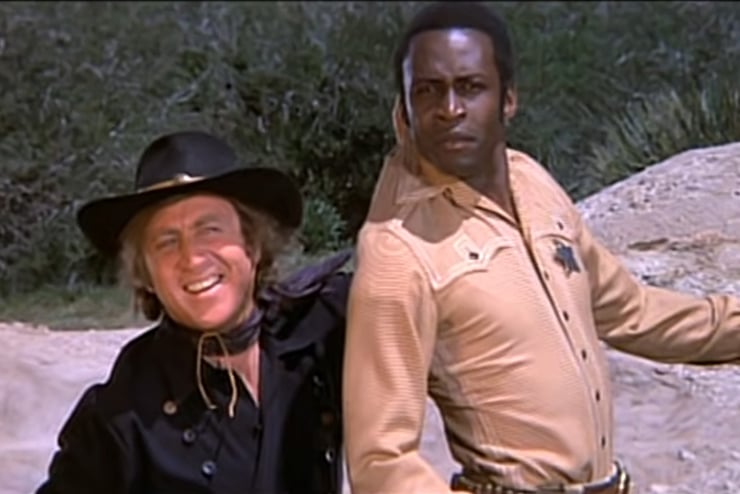Next month marks half a century since Blazing Saddles, which opened on February 7, 1974. The Mel Brooks film easily makes the list of movies that would not be made today. That’s a good thing because the original has a lot going for it.
As some critics have pointed out, Mel Brooks is an equal opportunity offender. Bear in mind that one of the writers was Richard Pryor, who could laugh at prejudice with the best of them. As veterans of the time will attest, we all laughed louder then. Fifty years down the road, the baleful woke squads detest comedy, and as Dave Chappelle has noted, the “alphabet people” proclaim themselves off limits. A new theatrical release for Blazing Saddles could help turn that around but in the meantime we could do with a refresher.
The villainous Hedley Lamarr (Harvey Korman) wants to build a railroad through the Western frontier town of Rock Ridge but he has a problem. “Unfortunately there is one thing standing between me and that property; the rightful owners.” So the story is based on property rights, which the outlaws and politicians alike fail to respect. In the early going, Rock Ridge is attacked by a gang of desperadoes, and the Rev. Johnson (Liam Dunn) wants to leave, but Gabby Johnson (Jack Starrett) isn’t having it.
“Get back here you “pious candy-ass sidewider,” Gabby proclaims. “There ain’t no way that nobody’s gonna leave this town. Hell, I was born here, an I was raised here, an dad gum it, I am gonna die here, an no sidewindin’ bushwackin’, hornswagglin’ cracker croaker is gonna rouin me bishen cutter.”
Olson Johnson (Dave Huddleston) is down with it: “Now who can argue with that? I think we’re all indebted to Gabby Johnson for clearly stating what needed to be said. I’m particularly glad that these lovely children were here today to hear that speech. Not only was it authentic frontier gibberish, it expressed a courage little seen in this day and age.”
If they are going to stay, the people need a new sheriff. As Frankie Lane said in the theme song:
When outlaws rule the West
And fear filled the land
A cry went up for a man with guts
To take the West in hand
The townfolk wire governor William J. Lepetomane, reportedly named after a French fart artist and played by Mel Brooks. The governor gets word from dazzling secretary Miss Stein (Robyn Hilton) that Rock Ridge has been attacked.
“Holy underwear! Sheriff murdered! Innocent women and children blown to bits!” the governor proclaims, “We’ve got to protect our phony-baloney jobs, gentlemen.” There, in a raucous comedy, is perhaps the truest line every spoken in the movies, and one valid to this day. The governor agrees with Lamarr’s plan to send a black sheriff, wonderfully played by Cleavon Little, a railroad worker arrested for assaulting Taggart (Slim Pickens) with a shovel.
Initially rejected because of his race, Bart wins over the townfolk by outwitting the evil Mongo (Alex Karras). Bart also resists the charms of Lili Von Shtupp (Madeline Kahn), sent by Lamarr to “seduce and abandon” the sheriff. As in The Producers, Brooks throws in a little music and dance. The cowboys get a fine show, complete with a reference to “Byron and Shelley” that might have been lost on some viewers. After Lili’s failure, Hedley Lamarr seeks a new gang to take down Rock Ridge.
“I want rustlers, cut throats, murderers, bounty hunters, desperadoes,” Lamar dictates to Taggart, “mugs, pugs, thugs, nit wits, halfwits, vipers, snipers, con men, Indian agents, Mexican bandits, muggers, buggerers, bushwhackers, hornswogglers, horse thieves, bull dykes, train robbers, bank robbers, ass-kickers, sh– kickers and … Methodists!” In the hiring process, Lamarr demands qualifications.
“Rape, murder, arson and rape,” one bad guy says.
“You said rape twice,” notes Lamarr.
“I like rape,” replies the candidate, who is promptly hired.
To fight off the murderers, buggerers, thugs and such, Sheriff Bart teams with the Waco Kid (Gene Wilder), whose classic back story is not to be missed. Despite one unfortunate encounter, the Kid still has the fastest hands “in the world.”
The townfolk are okay with the railroad workers but as Olson Johnson says, “we don’t want the Irish!” The black and Chinese workers hold off until “everybody” is on board. Call it an early example of diversity and inclusion, and together they take down the bad guys.
Fifty years on, as we might expect, the credits of this classic need updating, even as its legacy endures. Liam Dunn left town for good in 1976. Slim Pickens, who rode the bomb in Dr. Strangelove, left the scene in 1983. Jack Starrett, master of “authentic frontier gibberish,” closed out in 1989. Lili Von Shtupp may have been “sick and tired of love,” but Madeline Kahn endured until 1999.
Cleavon Little passed away in 1992 and Gene Wilder in 2016. Richard Pryor, paired with Wilder in Silver Streak, stepped off stage in 2005. Dom DeLuise, choreographer of “The French Mistake,” hung on until 2009. Former NFL great Alex Karras, as Mongo “only pawn in game of life,” made it to 2012. Dave Huddleston grabbed a role in The Big Lebowski and bowed out in 2016.
Mel Brooks brought in the Count Basie to bust up “April in Paris” as Bart heads for his new job. The Count kept good time until 1984, a reminder of the big band era. Frankie Lane actually thought Blazing Saddles was a serious cowboy movie—until the studio premier. The longtime hitmaker passed away in 2007.
Robyn Hilton strutted her stuff in Malibu Express and at this writing she is still around. So is Mel Brooks his own self, at the age of 97. His autobiography, All About Me, appeared in 2021, but fans of Blazing Saddles had known all along. To paraphrase the theme song, a cry went out for a man with laughs, and he answered the call in fine style.

Leave a Reply